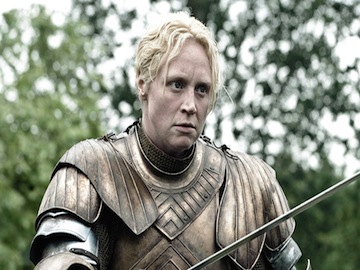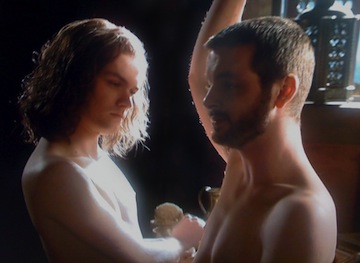WHEN I MOVED in with my boyfriend two years ago, I reluctantly sold my 59” Panasonic smart HDTV blue ray monster flat screen with easy streaming for a mere hundred bucks. When we broke up and I moved out, I had no bed and no TV. Without the benzoic orgy of pay cable dancing in my living room, I suddenly had ample time to write and read. I went to bed earlier and no longer dreamt about headless zombies floating in aquariums. But as much as I convinced myself that these were positive changes, I longed for Project Runway and I’d become hopelessly devoted to Anthony Bourdain: Parts Unknown. Besides, I don’t fall apart well. And I missed Tim Gunn.
A few days later, I was invited to a Game of Thrones party, where eight people crammed together on a couch to watch the show and discuss it over jicama tacos and homemade chocolate brownies. You should know I skipped the remake of The Hobbit and I’ve never once played Dungeons and Dragons. I don’t break for wizards and I have never dated a man in a black skirt with a silver Ankh who claimed to be a warlock, so Game of Thrones did not appeal to me at first. A couple of people at the party had read the books on which the series is based (I have not) and were passionately dissecting the previous season. To my surprise, this was no swords-and-sandals snooze fest. This was queer politics and scandalous sex at its finest.
I was immediately seduced by all of the fierce bitches: I fell hard for the unburnable mother of dragons, Daenerys Targaryen, with her secretly warm heart, regal poise, adorable pet dragons and claim to the iron throne. I became smitten with Cersei Lannister, the ruthless, braided blonde manipulating her path to the Queen Dom. I dug Arya Stark and her soft butch swordsmanship and tricky espionage. I adored Brienne of Tarth, a ruthless and capable amazon knight, passionately loyal to Lady Catelyn Stark. And, who doesn’t love an ex-sex worker fire witch who’s into blood play and gives birth to a smoke baby?
While fixated on the badass female characters in Game of Thrones, I also found a plethora of maimed and disfigured misfits that were more relevant than the hetero-normative or morally pure characters. In fact, the characters that were defective or queer tended to survive. There are exceptions to this assertion.* Working as a stripper for decades, I knew commonplace stigma applied to sex workers. The world assumes we are a broken and tragic lot with low self worth and no palpable ambition. And while I succeeded at shirking those judgments in general, on a personal level, I’d long identified as a reject—an outlier due to my history as an out member of the trade. While pushing for sex worker rights and visibility for years, a teeny part of me was haunted by deep, personal rejection from lovers and friends. It slipped into the cracks when I was on the pole and made me feel disfigured. The prostitutes and ex-sex workers in Game of Thrones were not only likeable, appealing characters; they were complicated, respected and tough.
Plot-wise, the women were idiosyncratic with their constant betrayals and clashing agendas, but beneath that were several sororal femme (lesbian) alliances forming, demonstrating a queer logic akin to the transactional bond of sex workers: daughters married off and traded for security and power—which placed them at risk for being murdered, but they were also in cahoots with one another, locking elbows, trading up, eye to eye. And the whores had their own culture and access to power: prostitutes** had their (free) way with a virgin client, and one married the king’s son, which may have clogged American audiences’ anti-sex worker arteries but made me squeal with delight.
While gayness and incestuous affairs were small-time transgressions whispered about in court, ultimately, it was safer to be a gallant swordsmen (in and out of the bedroom) than it was to be straight and pregnant. For, when goblets were raised in Game of Thrones, a sharp knife twinkled beneath a nearby cloak and winked at the unborn heir.
The misfits, oddballs and disfigured outliers figured importantly to the plot and survived better than the hetero-normative or morally pure characters who got killed off or became irrelevant, and while this was often expressed physically, it was sometimes more nuanced. It became clear while watching Game of Thrones that our vulnerable parts are the muscle tissue we need to persevere and our emotional horns and phantom limbs can be our assets. Of the maimed or deformed characters that remain alive, some of my favorites are Bran Stark (crippled and later a powerful psychic), Hodor (protects Bran Stark, is an enfeebled giant who can only say “Hodor”) and Tyrion Lannister, a snarky, well-hung dwarf, his face badly scarred in battle, who was forced to watch the first girl he ever loved, Tysha, prostitute herself to a battalion of soldiers after his wealthy father, Lord Tywin, heard of their secret marriage. And soon afterwards, Tyrion fell madly in love with another mysterious and tenacious prostitute, Shae, much to his father’s horror.
The plot twists in Game of Thrones, although often brutal in their violence, are also lush and humane in this way. Desire is heeded, regardless of status and class. Heads and hands are lopped off on a whim; spy master eunuchs use their wit as leverage in a place and time where a misstep means sudden death. But in a cold black forests with ghosts made of glass and discarded babies, tenderness happens: One male baby is saved as aggressive crows circle. A prisoner is shown one tiny act of mercy—a man offers him an escape boat in the night. And in those tiny acts of mercy I unclenched my fist, because it is within our oddities and tenderness where humanness shines. And in my quest to disappear into the addictive, lonely utopia of cable TV, I realized television didn’t have to be an emotional sinkhole; it could cultivate and inspire community. I could thrive as a broken, maimed and defective character and emerge more human by my defects. Perhaps my chinked armor and malfunctioned parts are an asset to my survival—a tiny boat in the night I could offer someone else so they could cross the torrential river to solid shore.
*Renley Baratheon, the show’s number 1 gay was killed by a magical assassin his brother created by fucking the fire witch and then she gave birth to the smoke baby. Renley wanted what was best for the people and thought he would be a more kind and loving ruler than his asshole brother, Stannis. The educated hooker, Roz became a business assistant for Pimp Little Finger but was spying on him for The Spider. She got sold to the king and was murdered in sexually sadistic fashion.
**A lot of the female characters in Game of Thrones are either prostitutes or ex-prostitutes, and this carries a stigma—but is also empowering—especially the characters who have obtained an elevated status. They are: The Spider, Roz, Shae, Tysha and Melisandre.





Pingback: Game of Thrones: Queer Politics, Scandalous Sex — The Good Men Project